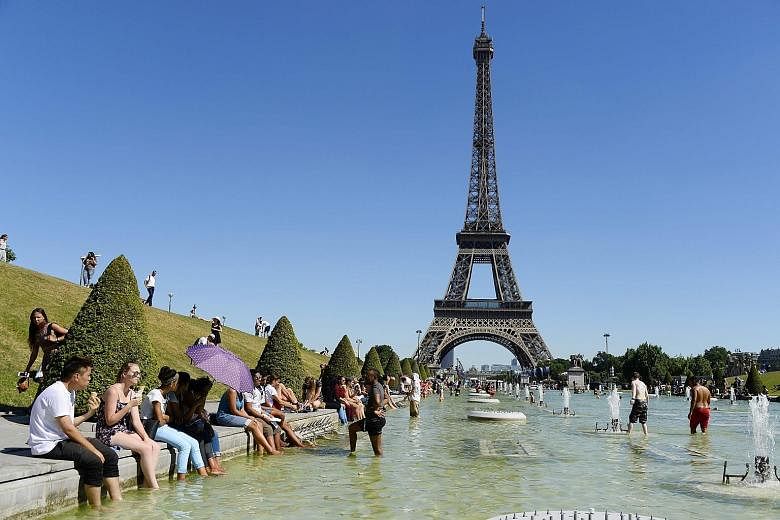PARIS • The shocks have come one after another. Killings of civilians by the Islamic State in Iraq and Syria (ISIS) in Brussels and Nice. A deadly outburst of terrorism in Germany. A fresh terror-linked atrocity in a small French town.
Warnings abound that more may be on the way.
The surge of attacks in Europe has raised questions over whether a potentially durable new threat to stability is settling in. The political challenges for Europe's leaders are stark, and the impact on the region's economy may be just as profound.
"We are experiencing a structural change, a phenomenon of war on our doorstep that didn't exist before," said Mr Georges Panayotis, president of the MKG Group, a tourism consulting company in Paris.
"If it's not resolved, the problem will continue."
The effects of that shift on businesses, large and small, have been deep.
At Mont Saint-Michel, a spectacular mediaeval abbey that is one of France's top tourist destinations, business at the Sodetour Group, a chain of local hotels and restaurants, slumped by up to 70 per cent for months after the Nov 13 terrorist attacks in Paris. It has never fully recovered.
American and Japanese visitors, in particular, cancelled reservations even though the site, perched on an isolated rock off the north-west coast of Normandy, is far from Paris.
Sodetour Group's chief executive, Mr Gilles Gohier, said he had to tell nearly a third of his 230 employees to go home for four months, and temporarily shut half of his five hotels and four restaurants.
Business had just started to revive when the Bastille Day massacre in Nice happened.
Cancellations jumped by 20 per cent and were expected to rise further after last week's killing of a priest in Rouen, located in lower Normandy, an attack carried out by militants claiming allegiance to ISIS.
"What happened in Rouen shows that it could happen here, or anywhere," Mr Gohier said.
"This makes it impossible to plan for business in the future."
All of that has hit the European economy in one of its most vital sectors - tourism - just as a tenuous recovery was starting to take hold.
This year, growth in the 19 countries that use the euro returned to levels not seen since the 2008 financial crisis.
On Friday, the European Union reported that the momentum slowed in the second quarter, as the economy advanced just 0.3 per cent from April to June, down from 0.6 per cent in the previous quarter.
France slid back into stagnation with zero growth in the three months to June from the previous quarter.
European governments are spending billions of euros on enhanced domestic security and operations against ISIS, even as Brussels pressures countries to cut deficits.
At Paris Plages, a makeshift beach along the Seine, a dozen armed police officers guarded an entry checkpoint on a recent day.
Army troops marched past families playing in the sand and half-empty activity points along the river. The patrols, which cost taxpayers about €1 million (S$1.5 million) a day, will add to an already mounting bill after France pledged to spend €816 million this year to reinforce security.
The ripple effect has been tangible. Rental apartments in Paris and Nice sat empty after people cancelled plans to visit France, said Ms Adrian Leeds, head of a French real estate agency. Clients thinking of moving to France have suspended their property searches.
"It has really affected things," she said. "But people will come back when things have settled down."
NEW YORK TIMES

